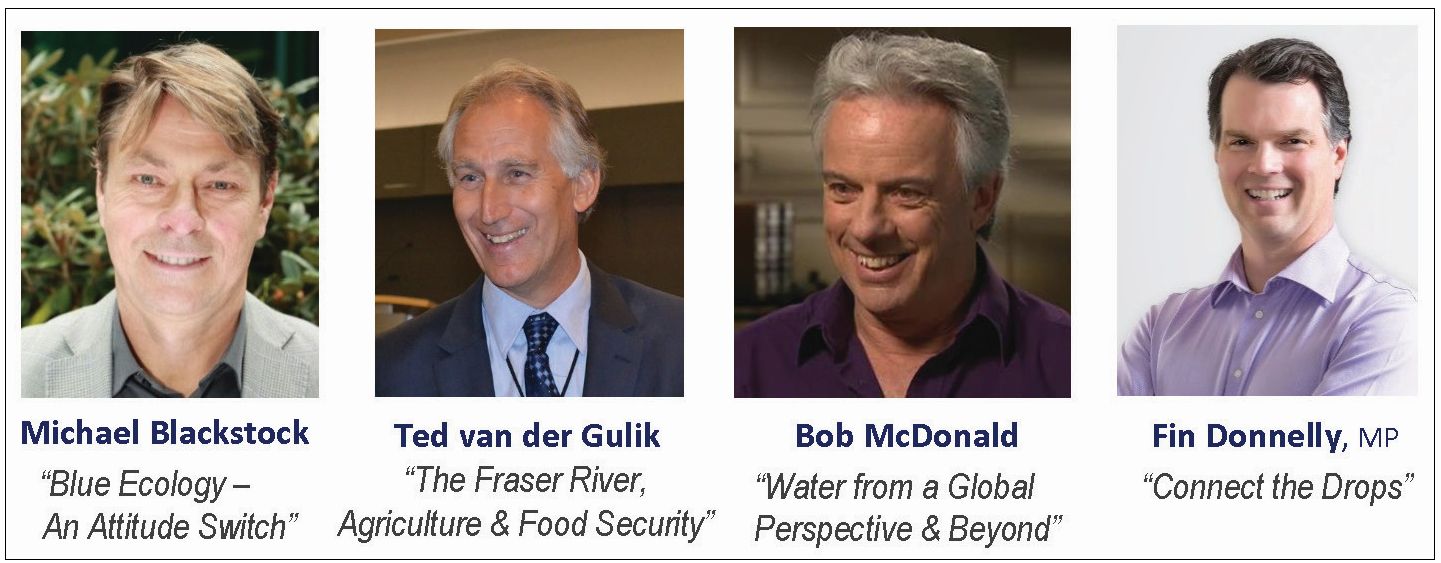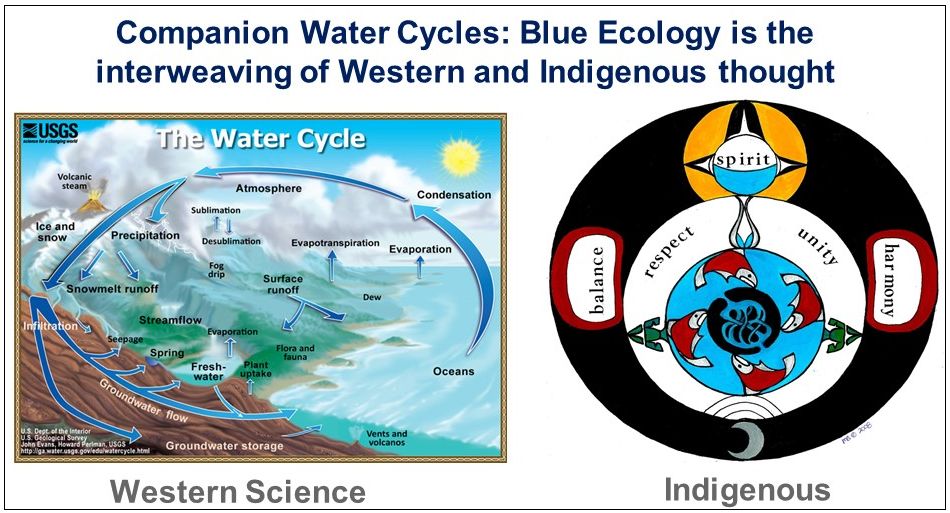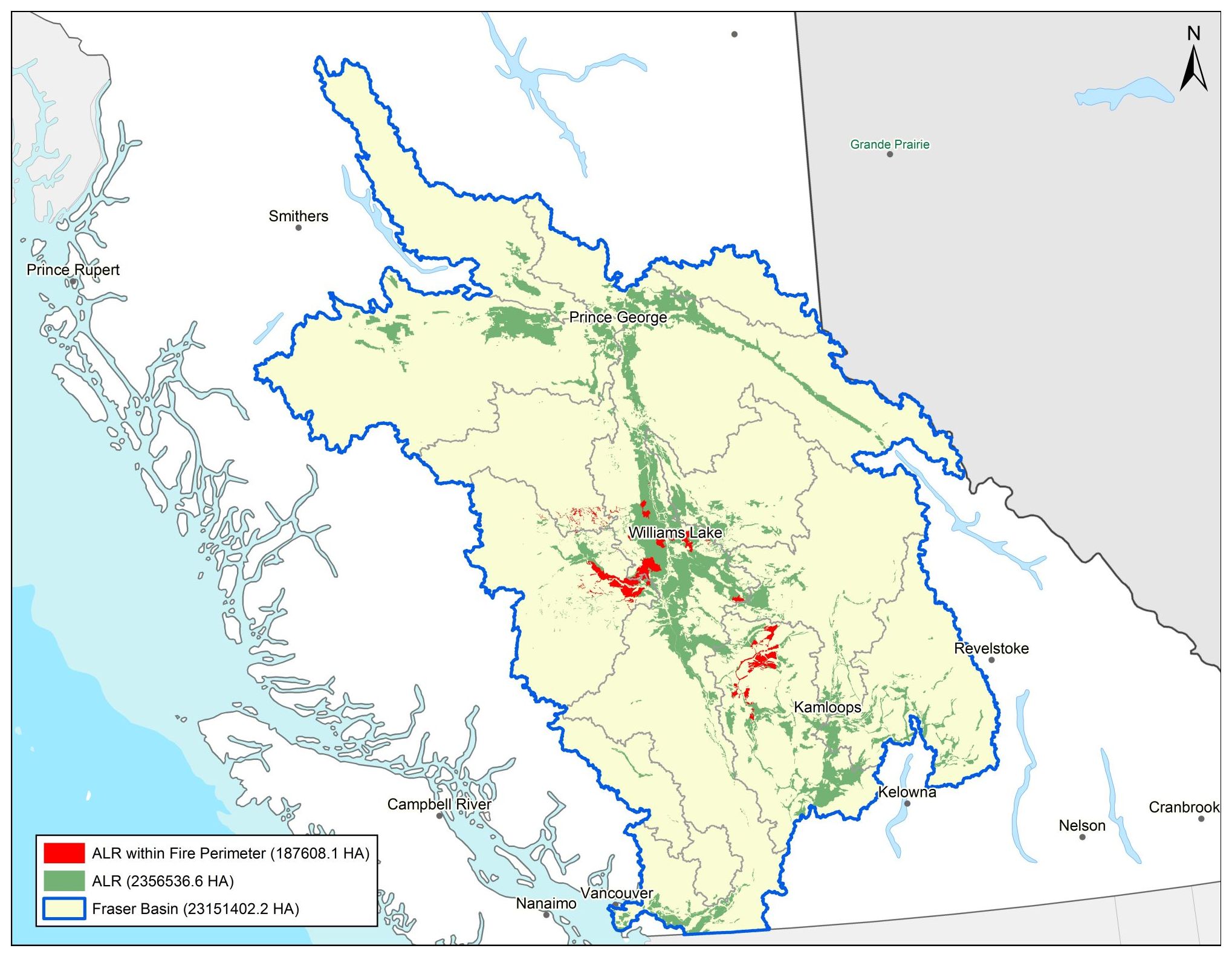BLUE ECOLOGY WORKSHOP – MODULE 2 (Nov 28, 2017): “Climate change may drastically impact the availability of fresh water for agriculture on Canada’s most productive agriculture land, the lower Fraser Valley,” stated Ted van der Gulik, President of the Partnership for Water Sustainability
Note to Reader:
Water is THE issue of the 21st century, both around the world and even here in Canada where we have more water than anyone. Instabilities in the water cycle are increasingly apparent. Consider the extremes that British Columbia has experienced in 2015, 2016 and 2017 – flood, drought, fire, wind and cold. Droughts and wildfires will shape our future.
Adapting to a changing climate requires transformational changes in how we apply hydrologic understanding, value nature, and service land – this is a unifying theme for the Blue Ecology Workshop on November 28th in Richmond. Designed to be a conversation starter, the Blue Ecology Workshop will have a town-hall format to create a ‘sharing & learning’ atmosphere for interaction between the audience and the presentation team. Guided by a water-first vision for setting priorities, Blue Ecology is a message of hope. It is an ecological philosophy that looks at the water cycle differently.
TO REGISTER, VISIT: https://www.civicinfo.bc.ca/event/2017/Blue-Ecology

The four featured presenters on the Blue Ecology Workshop team
Module 2 – The Fraser River, Agriculture and Food Security
“The message is clear – for British Columbians to adapt to a changing and unstable climate, a new culture of water is necessary. This is a challenge of our time,” states Kim Stephens, Executive Director, Partnership for Water Sustainability in British Columbia.
 “The process for adapting starts with an attitude change. In the words of Michael Blackstock, it costs nothing to change your attitude!
“The process for adapting starts with an attitude change. In the words of Michael Blackstock, it costs nothing to change your attitude!
“Opportunities for land use, infrastructure servicing and asset management practitioners to change their attitudes and make a difference are at the time of (re)development.
“To those folks we say: share and learn from those who are leading change; design with nature; ‘get it right’ at the front-end of the project; build-in ‘water resiliency’; create a lasting legacy.”
Interweaving Means…
“Interweaving is a collaborative process where apparently contradictory ways of knowing water, such as Western Science and Indigenous Knowledge, are brought together as coexisting threads to produce a new cooperative theory called Blue Ecology,” states Michael Blackstock.
“Interweaving requires humility and hope from both partners, as they weave each other’s contributing threads of knowledge into a new vision for our future – a new attitude towards water which will unlock creativity to solve climate change problems.”

Connect the Dots!
Everything is connected. Actions have consequences. And what happens in the upper reaches of the Fraser River Basin has ripple effects in the downstream reaches. Similarly, what happens at a global scale has consequences for agriculture and food security in British Columbia.
At the Blue Ecology Workshop, Ted van der Gulik will elaborate on facts and figures that are not widely known. “To make the right choices for agriculture moving forward, and as Michael Blackstock reminds us, decision-makers at all levels and scales must understand how and where the rhythms of water are changing,” he says.
Ted van der Gulik was the Senior Engineer in the BC Ministry of Agriculture. When he retired from government in 2014, he was an inaugural inductee into the BC Public Service Hall of Excellence.
Provincial Picture
“BC’s farmers produce about 50% of all foods consumed in B.C., however they produce only 34% of the recommended consumption by Canada’s Food Guide to Healthy Eating,” states Ted van der Gulik.
“To attain food security and produce a healthy diet for the projected population in the next 20 years, we need some 2.8 million hectares to be in farmland production. There is also the matter of how much farmland is irrigated. Currently about 190,000 hectares are irrigated in British Columbia. A 50% increase in irrigated area is necessary for food security.”

Fraser River Basin
“The watershed area tributary to the Fraser River encompasses approximately one-third of British Columbia’s land base. Agricultural land accounts for 10 percent of the Fraser Basin area and about 3% of the entire area of British Columbia. The small amount of agricultural land that is situated in the lower mainland is a tiny portion of this agricultural land base but it is some of the most productive agricultural land in all of Canada.
“However, the most productive agricultural land is situated in the lower Fraser Valley. This is one of the most productive agricultural regions in all of Canada. Half the total provincial farm gate receipts come from the Fraser Valley.”
Irrigation Potential in the Fraser Valley
“The irrigated area in the Fraser Valley has increased dramatically over the past 25 years. This is due to a combination of higher value crops and drier summers that require irrigation to guarantee a productive crop,” explains Ted van der Gulik.
“The agricultural area irrigated in the Fraser Valley is substantial – for example, it is about 1.4 times that in the Okanagan, a fact that is not intuitive to most people.
agricultural area irrigated in the Fraser Valley is substantial – for example, it is about 1.4 times that in the Okanagan, a fact that is not intuitive to most people.
“Also, the potential buildout for irrigated farmland in the Fraser Valley is about 2.4 times what is currently irrigated. This means that the Fraser Valley alone could provide two-thirds of the additional irrigated land area that is needed for food security. Think about that!
“The Fraser River would be able to supply much of the water required. But delivering the water would require a huge investment in infrastructure.”
Impacts of a Changing Climate
“In the Fraser Valley, the consequences of summer droughts increases the need for irrigation while rising sea levels and drought flows on the Fraser River reduce the window of obtaining fresh water of good quality. It is a double whammy,” states Ted van der Gulik.
“The critical issue is the salt wedge and window of opportunity for pumping water from the Fraser River. An increase in sea levels combined with a drought flow on the Fraser River would allow salt water to move further up the river in the future. This would shut down water supply intakes for a longer period of time, and could make it challenging to extract good quality irrigation water for use in Richmond and Delta.
“Simply put, the water supply window for Richmond and Delta could be reduced from 15 hours per day in 2017 to only 3 hours per day in the next 30 years. No longer is climate change a future scenario. It is here. Now is the time to develop a long term plan for obtaining quality irrigation water for these important agricultural lands,” concludes Ted van der Gulik.

TO REGISTER, VISIT: https://www.civicinfo.bc.ca/event/2017/Blue-Ecology

